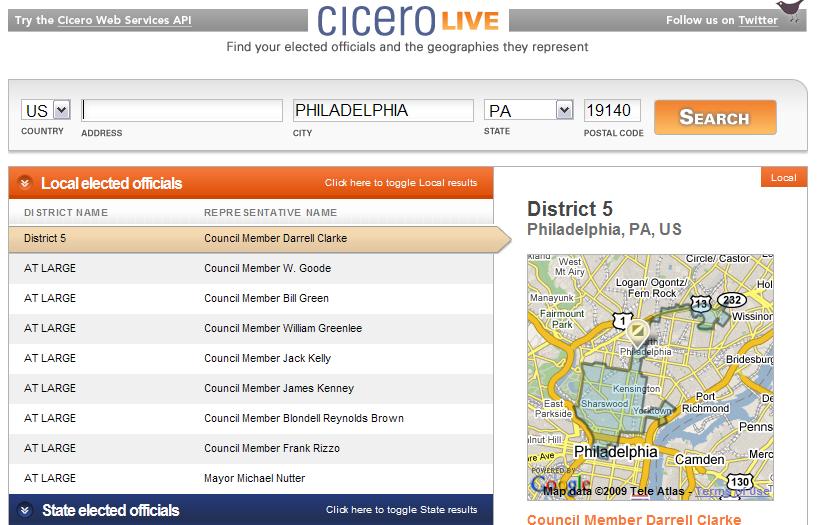
Updated: 3:51 5/7/09
Here’s a completely uncontroversial statement: the sloppy, meandering legislative districts that are used to keep incumbents in power are an embarrassment to our Republic.
Don’t worry, though, technology is going to solve that, too.
A cool, new version of a free subscription-based district-matching and legislative data API has been released by Avencia, a geographic analysis and software development firm based in the Poplar Callowhill neighborhood west of Northern Liberties.
The new version of CiceroLive, a free sample of the data and mapping tool Cicero API, which pools relevant information about political representatives at all government levels, including the district boundaries for 100 major U.S. cities, Canada, Australia, and New Zealand, comes before another likely round of redistricting in 2010, with new Census data arriving then.
Cicero can be used to generate district maps that show how an address fits into the political geography of the country and more than 100 cities nationwide. Read up on why they’re using the API platform.
The most recent upgrades to the Web service and database include faster map generation, new foreign countries, non-legislative boundaries like school districts and watersheds and the inclusion of several new city council districts from places as profoundly interesting as Orlando, Florida; Tulsa, Okla.; Berkeley, Calif., and, yes, high rolling Atlantic City.
These additions coincide with a loss of local legislative information nationwide, Philadelphia most certainly included. In February, we editorialized on the need for a Web-based local government database after the shuttering of Hallwatch.org. We’ve also seen a complete halt in the once exploding Harrisburg-based state government reform movement.
No one has found that purest use for the Cicero API but not for lack of interest. Avencia boasts that many established organizations and agencies are already using the API, a number of which are regionally based.
The Greater Philadelphia Cultural Alliance created a plugin to its advocacy software to immediately know which of their supporters are constituents of what legislator. When they want their voice heard, they can mobilize a targeted group of voters and make sure those representatives hear it.
But Avencia and their Cicero API are hardly local only.
On last election day, Nov. 4 2008, Avencia says the Oregonian used the API to let their readers match their address to live vote counts for important political races in the legislative districts relevant to their address.
It was local and geographically relevant.
Now that’s news.
Callowhill software developer Avencia releases legislative data API







